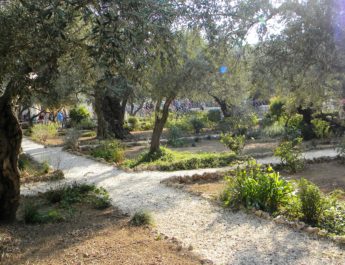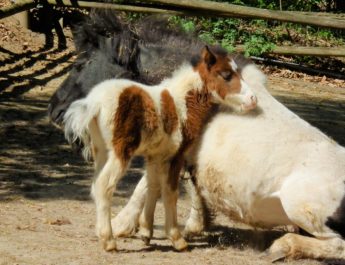Psalm 110
Of David.A A Psalm.B
1 The LordC saysD to my lord,E
A “David” = David. From the same as dod (beloved, love, uncle); the root may mean to boil, which is used figuratively to describe love. So, this implies someone you love such as a friend, a lover, or a close family member like an uncle. David’s name likely means something like “beloved one.”
B “Psalm” = mizmor. From zamar (making music; used specially of music to worship God; music with singing, singing praise, singing psalms); may be from zamar (to trim or prune). This is a melody or a psalm.
C “Lord” = YHVH. From havah (to be, become) or hayah (to come to pass, become, be). This is the name of the God of Israel, the self-existent and eternal one, the tetragrammaton. This pronunciation has been lost to time so “Lord” is generally used in its place.
D “says” = neum. From na’am (to speak a prophecy; properly, to whisper, which implies saying an oracle). This is an utterance or speaking an oracle.
E “lord” = adon. From a root that means ruling or being sovereign. This is lord, master, or owner.
“SitF at my right handG
until I makeH your enemiesI your footstool.”J
F “sit” = yashab. This is to sit and so to remain and so to dwell. It is sitting for any reason – as a judge, in order to ambush, or just sitting quietly. Causatively, this can mean settling or marrying. This can also mean continue, endure, or establish.
G “right hand” = yamin. May be from yamam (to go or choose the right, use the right hand; to be physically fit or firm). This can mean right hand, right side, or south. Since most people are right-handed, the metaphorical usage of this word presumes that the right hand is stronger and more agile. Thus, it is the instrument of power and action.
H “make” = shith. This is to place, set, bring, appoint, consider, bring, array or look.
I “enemies” = oyeb. From ayab (to hate or be hostile to). This is a foe or enemy as one that you are hostile to.
J “footstool” = hadom + regel. Hadom is 6x in OT. Root may mean to stomp on. It is a stool. Regel is foot, endurance, or journey. It is a foot as the means of walking and so it implies a step or a greater journey. It can be used euphemistically for private parts.
2 The LordK sends outL from ZionM
your mightyN scepter.O
K “Lord” = YHVH. Same as “Lord” in v1. See note C above.
L “sends out” = shalach. This is to send out, away, send for, forsake. It can also mean to divorce or set a slave free.
M “Zion” = Tsiyyon. Related to tsyiyyun (signpost, monument); from tsavah (to charge someone, to command, order); from the same as tsiyyah (dryness drought); from a root meaning parched as desert, dry land. Zion can refer to a mountain in Jerusalem as well as another name for Jerusalem itself or the people.
N “mighty” = oz. From azaz (to be strong, become fixed, be bold, prevail, be impudent; it means to be stout literally or figuratively. A Late Hebrew word). This is strength in the sense of force, majesty, praise, material and physical strength, the abstract notion of security. It can also speak of social or political power.
O “scepter” = matteh. From natah (to stretch or spread out, extend, bend). This is a staff, rod, branch, or tribe. It could be a rod for discipline or correction. It could be a scepter to indicate authority, a throwing lance, or a walking staff. Figuratively, it could also be something that supports life (like bread).
RuleP in the midstQ of your foes.R
P “rule” = radah. This is to step down, rule, dominate, have victory over, crumble.
Q “midst” = qereb. Perhaps from qarab (to come near or approach). This is among, in the midst, before, the center It is the inward part, whether literal or figurative. It can also be used for the heart, the site of thoughts and feelings. This word is also used as a technical term for the entrails of the animals who are sacrificed.
R “foes” = oyeb. Same as “enemies” in v1. See note I above.
3 Your peopleS will offer themselves willinglyT
on the dayU you lead your forcesV
on the holyW mountains.X
S “people” = am. From amam (to darken, hide, associate; creating shadows by huddling together). This is people or nation. It can be used specifically for a tribe, collectively of troops or armies, or figuratively to refer to a flock of animals.
T “offer themselves willingly” = nedabah. From nadab (to offer willingly, volunteer, freely give, be willing). This is a freewill offering, something giving spontaneously.
U “day” = yom. Root may mean being hot. This is the day in a literal or figurative sense. It can also mean birth, age, daylight, continually or other references to time.
V “forces” = chayil. From chul (to be firm, strong, prosperous; to endure). This is strength, wealth, ability, activity. It can refer to soldier or a company of soldiers as well as goods. It is a force of people, means, or goods. It can speak of valor, virtue, or strength.
W “holy” = qodesh. This is set apart and so sacred. God is different from us and so God is holy/set apart. Things we dedicate to God’s service are set apart for God and so they, too, are holy, etc.
X “mountains” = hadar. From hadar (to honor or adorn; majestic, respected, glorious; to favor or honor; to be proud). This is ornament, splendor, beauty, dignity, majesty, magnificence, and glory.
From the wombY of the morning,Z
like dew,AA your youthBB will come to you.
Y “womb” = rechem. Related to racham (compassion, tender love, womb, compassion; the womb as that which cherishes the fetus). This is a womb.
Z “morning” = mishchar. 1x in OT. From the same as shachar (dawn, early light, or morning). This is dawn or day break.
AA “dew” = tal. Perhaps from talal (to cover, roof, strew). This is dew or mist as something that covers plants.
BB “youth” = yalduth. 3x in OT. From yalad (to bear, bring forth; can mean to act as midwife or to show one’s lineage). This is youth or childhood.
4 The LordCC has swornDD and will not change his mind,EE
CC “Lord” = YHVH. Same as “Lord” in v1. See note C above.
DD “sworn” = shaba. Perhaps from sheba(seven – the number of perfection/sacred fullness). This is to swear, curse, vow, make a covenant. Properly, it can mean to be complete. This is to seven oneself – as in affirming something so strongly it is as though it were said seven times.
EE “change his mind” = nacham. Properly, this is a strong breath or a sigh. This can be to be sorry, to pity, console. Comfort, or repent. But, one can also comfort oneself with less righteous thoughts, so this can also mean to avenge oneself.
“You are a priestFF foreverGG according to the orderHH of Melchizedek.”II
FF “priest” = kohen. This is literally the one who officiates i.e. the priest. This is where the Jewish last name “Cohen” (and its variants) comes from.
GG “forever” = olam. This is a long scope of time whether in the past (antiquity, ancient time) or in the future (eternal, everlasting).
HH “order” = dibrah. 5x in OT. From dabar (to speak, declare, discuss, destroy, subdue). This is a reason, order, end, cause.
II “Melchizedek” = Malki-tsedeq. 2x in OT. From melek (king, royal) + tsedeq (rightness, righteousness, just cause, vindication; that which is right in a natural, moral, or legal sense; abstractly equity; figuratively prosperity). This is Melchizedek, meaning, “my king is right.”
5 The LordJJ is at your right hand;
he will shatterKK kingsLL on the day of his wrath.MM
JJ “Lord” = Adonai. Related to “lord” in v1. From adon (see note E above); root means to rule or be sovereign. This is the actual Hebrew word for Lord used (in a different form) of humans and (in the present form) of God. It means someone who is in control.
KK “shatter” = machats. 14x in OT. This is to dash asunder, severely wound, strike, crush. Figuratively, it is to subdue or destroy.
LL “kings” = melek. Related to “Melchizedek” in v4. See note II above.
MM “wrath” = aph. From anaph (to be angry; properly, breathing hard as a signifier of being enraged). This properly refers to the nose or nostril and by extension the face. It can specifically refer to anger or wrath as one breathes hard and nostrils flare in times of great anger.
6 He will execute judgmentNN among the nations,OO
fillingPP them with corpses;QQ
NN “execute judgment” = din. This is to judge, defend, dispute, govern, quarrel, plead.
OO “nations” = goy. From the same root as gevah (the back, person, or body); related to gev (among); related to gaah (to rise up). This is nation or people. Often used to refer to Gentiles or foreign nations. It can also be used figuratively for a group of animals. This is where the Yiddish “goy” comes from.
PP “filling” = male. This is fill, satisfy, replenish, accomplish, fulfill, confirm, or consecrate. It is fill in a literal or figurative sense.
QQ “corpses” = gviyah. Related to “nations” in v6. 13x in OT. From gevah (see note OO above). This is a living or dead body or corpse.
he will shatter headsRR
over the wideSS earth.TT
RR “heads” = rosh. This may come a word that means to shake. It is the head, captain, or chief. It can also be excellent or the forefront. It can be first in position or in statue or in time (i.e. the beginning).
SS “wide” = rab. From rabab (increasing in any aspect whether quantity, authority, size, quality, greatness, etc.). This is abundance, many, elder, exceedingly, great. It refers to abundance of amount, rank, or status.
TT “earth” = erets. Root may mean to be firm. This is earth, ground, field land, or country.
7 He will drinkUU from the streamVV by the path;WW
therefore he will lift upXX his head.
UU “drink” = shathah. This is to drink literally or figuratively. It could also be a drinker.
VV “stream” = nachal. From nachal (to take as heritage, inherit, or distribute). This is a river or stream. It could be a wadi or arroyo – sometimes a narrow valley with no water at all, but in strong rains or when winter snow melts, it swells or floods with water.
WW “path” = derek. From darak (to tread, march, to walk. Can also mean affixing a string to a box since one needs to step on it to bend it in the process; so also an archer). This is a road as a thing that is walked on. Can be used figuratively for the path that one’s life takes or how one chooses to live one’s life.
XX “lift up” = rum. This is to rise or raise, to be high literally or figuratively. So it can also mean to exalt or extol.
Image credit: “Nahal Kaziv” – a stream in Western Galilee by Suleiman Alhaldi, between 2008 and 2010.




